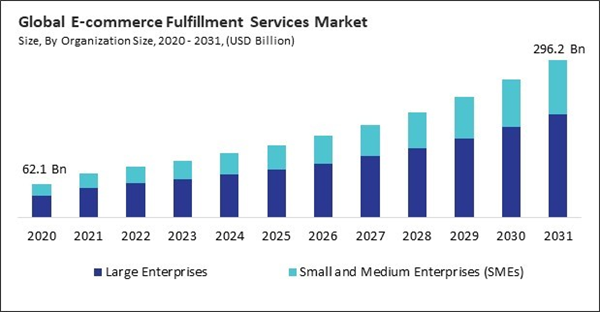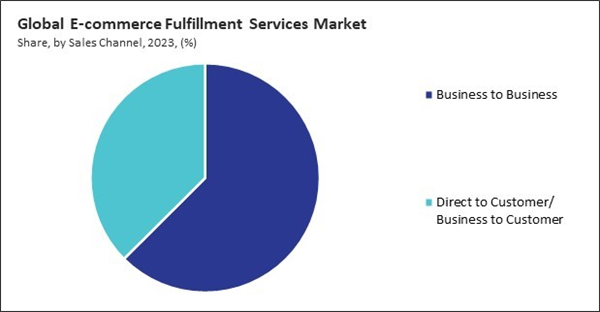The Asia Pacific region has been significantly influenced by the rapid expansion of e-commerce in countries such as India, China, and Japan. As a result of the increasing disposable incomes and the widespread use of mobile Internet, there has been a significant increase in online purchasing throughout the Asia Pacific region. Consequently, the region would acquire nearly 32% of the total market share by 2031.
The global rise in e-commerce sales has been one of the most transformative trends in the retail industry, significantly accelerated by the COVID-19 pandemic. This rapid increase in e-commerce activity has led to a corresponding rise in orders that fulfillment services must handle. Hence, the global rise in e-commerce sales, significantly accelerated by the COVID-19 pandemic, has substantially increased demand for fulfillment services.
Additionally, Technological advancements have significantly transformed the fulfillment process in recent years. One of the most impactful developments is automation, which streamlines various tasks such as sorting, packing, and shipping. Artificial Intelligence (AI) is also crucial in transforming fulfillment processes. AI-powered systems have the capacity to analyze immense quantities of data in order to enhance supply chain management, optimize inventory levels, and predict demand. Thus, the integration of technology is aiding in the growth of the market.
However, the logistics and supply chain management that are associated with e-commerce necessitate a significant financial investment in several important areas. Transportation is another significant expense in the fulfillment process. It involves moving goods from warehouses to customers, including domestic and international shipping. Hence, high warehousing, transportation, labor, and technology operational costs present significant obstacles to the market.
Driving and Restraining Factors
Drivers- Rapid expansion in e-commerce sales globally
- Technological advancements in e-commerce
- Expansion of omni-channel retailing
- High operational costs of fulfillment services
- Substantial barriers presented by inadequate infrastructure
- Surge in SMEs entering e-commerce
- Rising number of government support and policies
- Lack of workforce across various operations
- Substantial concern about security and fraud risks
Organization Size Outlook
By organization size, the market is divided into large enterprises and small & medium enterprises (SMEs). The small & medium enterprises (SMEs) segment garnered a 33% revenue share in the market in 2023. The solutions that fulfillment service providers offer are scalable and adaptable and are tailored to meet the particular needs of SMEs. These solutions include warehousing, shipment, order processing, and packing.Sales Channel Outlook
On the basis of sales channel, the market is classified into business to business and direct to customer/business to customer. The direct to customer /business to customer segment recorded a 37% revenue share in the market in 2023. The evolution of consumer behaviors, the proliferation of online purchasing platforms, and the growing demand for personalized shopping experiences have all contributed to the expansion of direct to customer/business to customer (D2C/B2C) e-commerce.Service Outlook
Based on service, the market is divided into shipping fulfillment services, warehousing & storage fulfillment services, bundling fulfillment services, and others. The bundling fulfillment services segment procured 21% revenue share in the market in 2023. The process of combining many products into a single bundle is known as bundling. Value-added services, such as promotional inserts, personalized branding, and bespoke packaging, are typically included in the bundles that are created through this process.Application Outlook
Based on application, the market is segmented into clothing & footwear, consumer electronics, home & kitchen application, beauty & personal care, sports & leisure, automotive, books & stationery, healthcare, and others. The consumer electronics segment acquired 18% revenue share in the market in 2023. Rapid technological advancements and the continuous launch of new electronic products have fueled online sales of consumer electronics. This segment requires specialized fulfillment services capable of handling fragile and high-value items, ensuring secure packaging, and providing real-time tracking.Regional Outlook
Region-wise, the market is analyzed across North America, Europe, Asia Pacific, and LAMEA. The North America segment garnered 37% revenue share in the market in 2023. This dominance is attributed to the high penetration of e-commerce in the region, driven by tech-savvy consumers and major e-commerce players like Amazon and Walmart.List of Key Companies Profiled
- Amazon.com, Inc.
- FedEx Corporation
- Deutsche Post DHL Group (The Deutsche Post AG)
- Marken (United Parcel Service, Inc.)
- ShipBob, Inc.
- Shipfusion Inc.
- Xpert Fulfillment Services
- Sprocket Express
- eFulfillment Service Inc.
- Shipmonk, Inc.
Market Report Segmentation
By Organization Size- Large Enterprises
- Small and Medium Enterprises (SMEs)
- Business to Business
- Direct to Customer/ Business to Customer
- Shipping Fulfillment Services
- Warehousing & Storage Fulfillment Services
- Bundling Fulfillment Services
- Others
- Clothing & Footwear
- Consumer Electronics
- Home & Kitchen Application
- Beauty & Personal Care
- Sports & Leisure
- Automotive
- Books & Stationery
- Healthcare & Others
- North America
- US
- Canada
- Mexico
- Rest of North America
- Europe
- Germany
- UK
- France
- Russia
- Spain
- Italy
- Rest of Europe
- Asia Pacific
- China
- Japan
- India
- South Korea
- Australia
- Malaysia
- Rest of Asia Pacific
- LAMEA
- Brazil
- Argentina
- UAE
- Saudi Arabia
- South Africa
- Nigeria
- Rest of LAMEA
Table of Contents
Companies Mentioned
- Amazon.com, Inc.
- FedEx Corporation
- Deutsche Post DHL Group (The Deutsche Post AG)
- Marken (United Parcel Service, Inc.)
- ShipBob, Inc.
- Shipfusion Inc.
- Xpert Fulfillment Services
- Sprocket Express
- eFulfillment Service Inc.
- Shipmonk, Inc.










